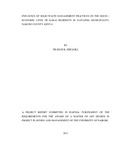| dc.contributor.author | Mwaura, Francis K | |
| dc.date.accessioned | 2013-08-12T08:44:59Z | |
| dc.date.issued | 2013 | |
| dc.identifier.citation | Mwaura,F.K.,2013.Influence Of Solid Waste Management Practices On The Socio – Economic Lives Of Karai Residents In Naivasha Municipality, Nakuru County, Kenya. | en |
| dc.identifier.uri | http://erepository.uonbi.ac.ke:8080/xmlui/handle/123456789/55747 | |
| dc.description.abstract | The purpose of this project was to assess the influence of solid Waste management practices on the socio –economic lives of the people living around and within Naivasha Municipality where a dumpsite that is located. The dumpsite is operated by the municipal council of Naivasha. Apart from the solid waste, the dumpsite is also indirectly affected by pollution of ground and surface water by leachates from the Karai Municipal disposal site that is located on a higher altitude relative to the lake. Degraded environments have placed heavy strains on the life of the community though it contributes to some welfare gains through some informal employment on solid waste management. The purpose of this study is therefore evaluating the social economic influences of various solid waste management practices undertaken by the area residents.
To achieve this, the study collected primary data and used both descriptive and inferential statistics to analysis. For the descriptive statistic, frequency distributions were used while for inferential statistics correlation analysis and cross tabulations were used to establish association of the variables analyzed. The data was analyzed using the SPSS software. Mean frequencies, percentages and one sample t-tests were also applied in the analysis in determining the mean.
Based From the survey, the mean total income from solid waste management practices is kshs 1614.87 with a maximum of KShs 2880. At the same time the mean from solid waste recycling is Kshs 1247.37 with a maximum of Kshs 2000. Out of the Kshs 1247.37, 16.7% is spent on health; 12.7% on education and food takes the highest percentage at 18.6%. The survey also indicated that the mean income from solid waste minimization/burning is Kshs 157.50 with a maximum of Kshs 380. Similarly, the food and health takes the highest percentage at 3.9% while education takes the least with 2.9 percent. In addition, the mean income from solid waste disposal was Kshs 210 and the percentage taken by health on the amount raised from solid waste disposal is 31.4 %, 34.3% 0n food and 30.4 % on education. This implies that Solid Waste Management practices has a positive influence on socioeconomic lives of Karai residents and shows that it contributes a lot to their socioeconomic expenditure leading to improved standards of living.
The researcher recommends segregation and coding of waste at household level to facilitate easier collection, disposal and recycling, Creation of awareness to households on SWM and existing policies, creation of effective PPPs to provide equipment and skills for independent and efficient SWM programs to generate revenue, Policy implementation as well as supported research and popularization of appropriate SWM methods. The researcher also recommends that further research should be conducted to ascertain the level of toxicity of the leachate in order to encourage more awareness campaigns to the Karai residents on the best waste management methods to adopt which do not endanger the surrounding ecosystem. | en |
| dc.language.iso | en | en |
| dc.publisher | University of Nairobi | en |
| dc.title | Influence Of Solid Waste Management Practices On The Socio – Economic Lives Of Karai Residents In Naivasha Municipality, Nakuru County, Kenya | en |
| dc.type | Thesis | en |
| local.publisher | College of Education and External Studies | en |

